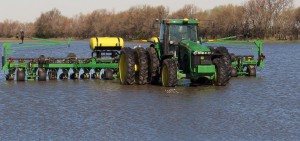The 2023 State of the Climate Report: “Entering Uncharted Territory“
Climate report: ‘Uncharted territory’ imperils life on EarthFrom the Article by Steve Lundeberg, Oregon State Univ., 10/24/23
PHOTO: Flooding and water damage in the Park and Tongue River Watersheds located in Cavalier, Pembina and Cavalaier Counties in ND
CORVALLIS, Ore. – An international coalition of climate scientists says in a paper published today that the Earth’s vital signs have worsened beyond anything humans have yet seen, to the point that life on the planet is imperiled.
William Ripple, a distinguished professor in the Oregon State University College of Forestry, and former OSU postdoctoral researcher Christopher Wolf are the lead authors of the report, and 10 other U.S. and global scientists are co-authors.
“Without actions that address the root problem of humanity taking more from the Earth than it can safely give, we’re on our way to the potential collapse of natural and socioeconomic systems and a world with unbearable heat and shortages of food and freshwater,” Wolf said.
Published in BioScience, “The 2023 State of the climate report: Entering uncharted territory” notes that 20 of 35 planetary vital signs the authors use to track climate change are at record extremes.
The authors share new data illustrating that many climate-related records were broken by “enormous margins” in 2023, particularly those relating to ocean temperatures and sea ice. They also note an extraordinary Canadian wildfire season that produced unprecedented carbon dioxide emissions.
The report follows by four years the “World Scientists’ Warning of a Climate Emergency” published by Ripple and collaborators in BioScience and co-signed by more than 15,000 scientists in 161 countries.
“Life on our planet is clearly under siege,” Ripple said. “The statistical trends show deeply alarming patterns of climate-related variables and disasters. We also found little progress to report as far as humanity combating climate change.”
Among the key numbers in the report:
1. Fossil fuel subsidies – actions by governments that artificially lower the cost of energy production, raise the price received by producers or lower the price paid by consumers – roughly doubled between 2021 and 2022, from $531 billion to just over $1 trillion.
2. Already this year wildfires in Canada have pumped more than 1 gigaton of carbon dioxide into the atmosphere, greater than Canada’s total 2021 greenhouse gas emissions of 0.67 gigatons.
3. In 2023, there have already been 38 days with global average temperatures more than 1.5 degrees Celsius above pre-industrial levels. Until this year, such days were a rarity, the authors note.
4. The highest average Earth surface temperature ever recorded came this past July, and there’s reason to believe it was the highest surface temperature the planet has seen in the last 100,000 years.
“As scientists, we are hugely troubled by the sudden increases in the frequency and severity of climate-related disasters,” said Wolf, now a scientist with Corvallis-based Terrestrial Ecosystems Research Associates. “The frequency and severity of those disasters might be outpacing rising temperatures. By the end of the 21st century, many regions may have severe heat, limited food availability and elevated mortality rates.”
The authors say policies are needed that take aim at the underlying issue of “ecological overshoot.” When human demand on the Earth’s resources is too large, the result in an array of environmental crises, including biodiversity decline. As long as humanity continues to put extreme pressure on the planet, any strategy that focuses only on carbon or climate will simply redistribute the pressure, they note.
“Our goal is to communicate climate facts and make policy recommendations,” Ripple said. “It is a moral duty of scientists and our institutions to alert humanity of any potential existential threat and to show leadership in taking action.”
The authors urge transitioning to a global economy that prioritizes human well-being and curtails overconsumption and excessive emissions by the rich. Specific recommendations include phasing out fossil fuel subsidies, transitioning toward plant-based diets, scaling up forest protection efforts and adopting international coal elimination and fossil fuel non-proliferation treaties.
They stress that all climate-related actions must be grounded in equity and social justice, noting that extreme weather and other climate impacts are being disproportionately felt by the poorest people, who have contributed the least to climate change.
Co-authors of the paper include Bev Law of the OSU College of Forestry, Jillian Gregg of Terrestrial Ecosystems Research Associates, Johan Rockström of the Potsdam Institute for Climate Impact Research, Thomas Newsome of the University of Sydney, Luiz Marques of Brazil’s State University of Campinas – Unicamp, Timothy Lenton of the University of Exeter, Chi Xu of Nanjing University, Saleemul Huq of Independent University Bangladesh, Leon Simons of the Club of Rome Netherlands, and Sir David Anthony King of the University of Cambridge.
>>> The CO2 Foundation and Roger Worthington, an attorney and the owner of Worthy Brewing in Bend, provided partial funding for this research.
xxx
